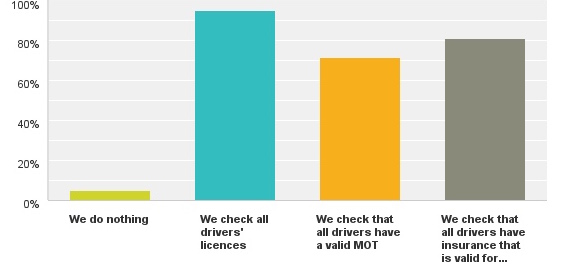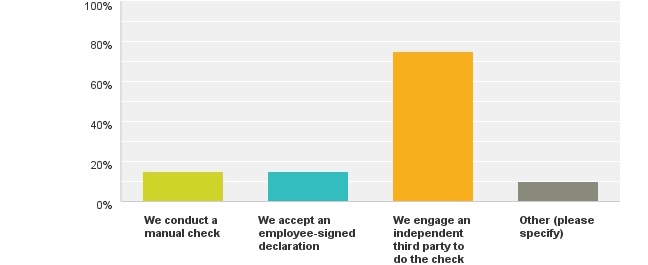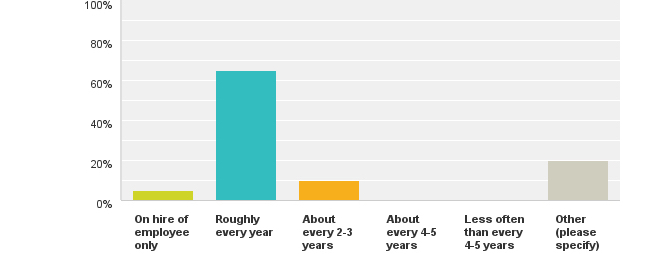Poll answers: How employers deal with corporate manslaughter rules and car allowances
Twenty one people took the time and trouble to help a fellow reward director and here are the results.
What do organisations do to meet Corporate Manslaughter obligations for staff who receive car allowances?

- 5% do nothing
- 95% check all drivers’ licences
- 71% check that all drivers have a valid MOT
- 81% check that all drivers have insurance that is valid for driving on business.
When doing checks, how do employers conduct them?

- 15% do a manual check
- 15% accept an employee signed declaration
- 75% engage an independent third party to do the check
10% do it slightly differently:
- We use an independent third party for driving licence checks while line managers conduct manual check for MOT and business insurance
- Drivers licences are checked against DVLA records by third party provider, including penalty points etc.
How often do employers conduct checks?

5% check on hire of employee only
65% check roughly every year
10% check about every 2-3 years
20% do it slightly differently:
- driving licences are checked quarterly, other checks are done annually
- we check every 3 - 6 months
- it depends on number points of on employee's licence. We conduct more frequent checks for those with higher points
- every time business mileage is reported on the system
This is how different employers deal with the problem of an employee not passing all of the checks (especially those eligible for company car):
- If in receipt of a car allowance this is removed and they cannot claim for business mileage.
- If eligible for a company car and it is a requirement of the role we would try to redeploy to a role without this requirement but could ultimately dismiss.
- Insist that they travel by train on company business.
- Refuse to allow use of car for business purposes and refuse to pay mileage expenses.
- If an employees car fails the check they will not be able to cliam the cash allowance or use the car on company business and will either have to replace it or join the company car scheme.
- Withdraw allowance.
- Follow up by line manager.
- If they do not have a valid driving license they are not eligible for company car but could take the cash allowance instead.
- Have them sign a waiver that they will not drive on company business, and potentially stop car allowance.
- They wouldn't be able to drive on company business. People with car allowances have to comply with our policies on vehicle age, emissions, safety standards and so on.
- They cannot drive a car on company business if they do not have a licence or have too many points etc. If they need to be able to drive for their role, then we may have to dismiss them if there is no suitable alternative for them (although we have never had to go down this route).
- Take up the issue with the individual to encourage remedial action.
- This will be down to discretion and what the failure is.
- Company car provision is different from treatment of car allowance .g. non-essential drivers and grey fleet (occasional drivers). Company cars provision falls under the overall fleet management.
- Address quickly and as appropriate - we can stop car allowance but would only do so as a last resort.
- For company cars we only check driving licence through permit to drive. If they don't have a valid licence they won't be offered a company car and the job offer may be withdrawn. MOT and insurance would be dealt with by the company for fleet drivers.
- If the role requires a car as part of the terms and conditions this could lead to removing them from the role, either offering a new role or dismissal.






